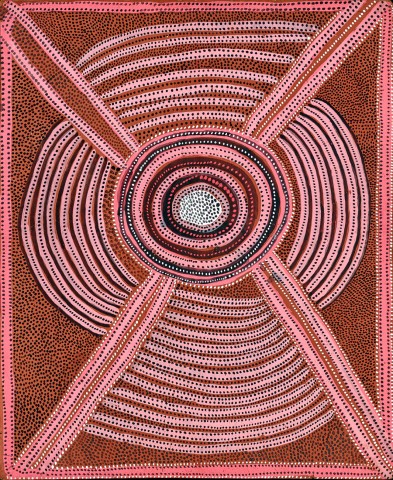UNTITLED, 1972
MICK NAMARARI TJAPALTJARRI
synthetic powder paint on composition board
62.0 x 51.0 cm
Painted at Papunya, Northern Territory in 1972
Private collection, Sydney
Sotheby’s, Melbourne, 25 July 2005, lot 150
Private collection, Victoria
Lawson~Menzies, Sydney, 23 May 2007, lot 22 (as ‘Wind Spirit’)
Private collection, Melbourne
This intriguing work by one of the doyens of the original Western Desert painting movement has been separated from its original documentation. The composition of the image and the palette bear comparison, however, to a number of paintings from the 1970s by Namarari that relate to the sun, the moon and the element of wind. The paintings in this group all feature a compositional structure based around a dominant central roundel from which emanate rays or lines in a symmetrical pattern to the corners of the picture plane.
One of these works, Wind Story, 1972, in the collection of the Museum and Art Gallery of the Northern Territory, Darwin1 features eight symmetrically arranged sets of lines or journey tracks radiating from a central roundel. The image refers to a north-westerly wind gusting out of a cave at Mount Liebig, one of the highest points in the MacDonnell Ranges. The painting relates to another of the same site created around 1972, Cave at Mount Liebig in the collection of the Art Gallery of South Australia, Adelaide.2
Mount Liebig occupies a significant place in Namarari’s life history. The artist lived there from time to time as an adult, but it was also the place where he first encountered Europeans. In 1932, an expedition lead by the eminent anthropologist Norman Tindale, from the University of Adelaide, camped at Mount Liebig and recorded all those living there. Namarari was aged nine at the time, and his photographic record is held at the South Australian Museum, Adelaide.3
The undulating lines that radiate in Cave at Mount Liebig also appear in another of painting by Namarari from 1972 – Birth of the Sun. This painting was originally collected by Geoffrey Bardon’s successor as manager of the Papunya Tula Artists cooperative, Peter Fannin and is now held in the collection of the National Gallery of Australia, Canberra.4 During the 1970s Namarari painted a number of works that depict celestial bodies apart from those commissioned by Bardon for his bio-documentary on the artist, Mick and the Moon of 1979. These include Moon Dreaming, 1978, and, Sunrise Chasing Away the Night, 1977 – 78, both in the national art collection in Canberra.5 This painting, Untitled, 1972, sits comfortably within this suite of works, most likely referencing Mount Liebig where the circular motion created by the sets of parallel arcs suggests the rush of wind.
1. Scholes, L. (ed.), Tjungunutja: From having come together, Museum and Art Gallery of the Northern Territory, Darwin, 2017, p. 104 (illus.)
2. O’Halloran, A. B., The Master from Marnpi: Mick Namarari Tjapaltjarri, LifeDesign Australia, Sydney, 2018, pl. PS3.2 (illus.), p. 164
3. Batty, P. (ed.), Colliding Worlds: First Contact in the Western Desert 1932–1984, Museum Victoria and National Aboriginal Cultural Institute Tandanya, Melbourne and Adelaide, 2006, p. 41
4. O’Halloran, A. B., pl. PS3.1, p. 164
5. illustrated in Cubillo, F. and W. Caruana (eds), Aboriginal & Torres Strait Islander Art: Collection highlights, National Gallery of Australia, Canberra, 2010, pp. 40 – 42 and also in Bardon, G. and J. Bardon, Papunya, A Place Made After the Story: The Beginnings of the Western Desert Painting Movement, The Miegunyah Press, Melbourne, 2004, pp. 248 – 9, painting numbers 169 and 170
WALLY CARUANA
